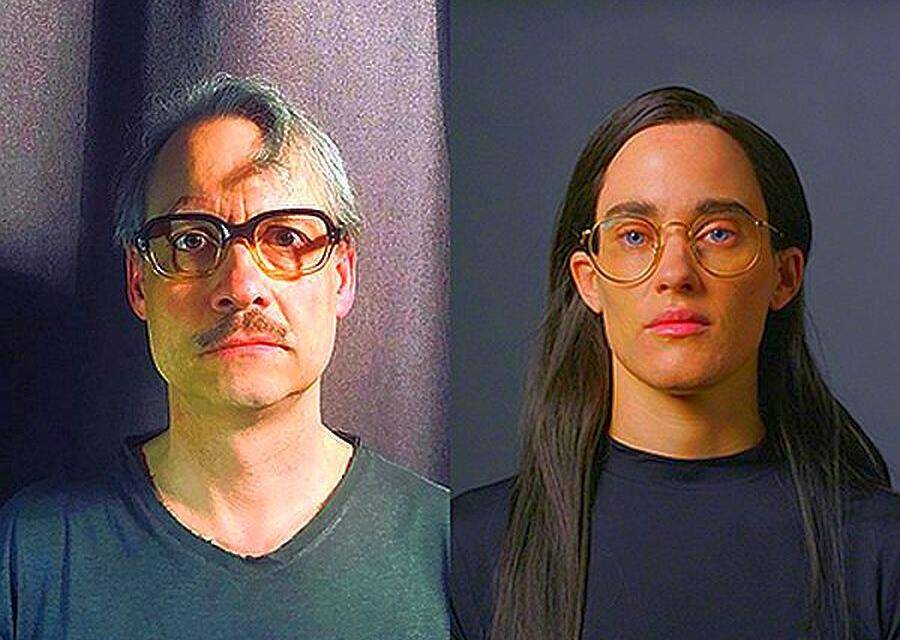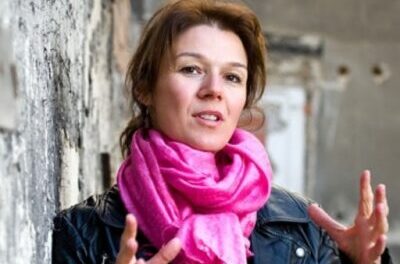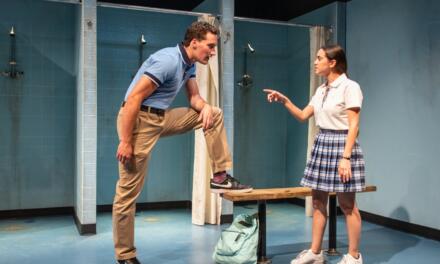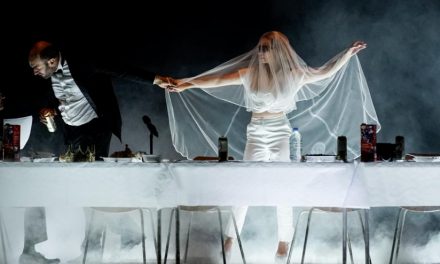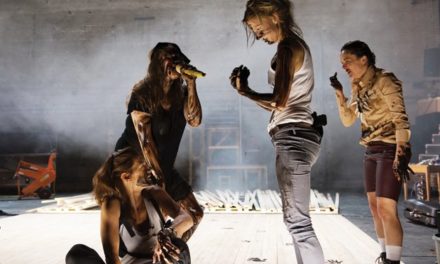Christian Tschirner aka Soeren Voima (he/him – author, theater maker, Schauspielhaus Hamburg) Born in 1969 in Lutherstadt Wittenberg, grew up in Karl-Marx-Stadt, now Chemnitz. After an apprenticeship as a zookeeper at Leipzig Zoo, he studied acting at the Hochschule für Schauspielkunst “Ernst Busch” Berlin from 1991 to 1995. Christian Tschirner has been working as a senior dramaturge at the Schaubühne in Berlin. Since 2023 he is part of Schauspielhaus Hamburg.
lynn t musiol (them/they – theater maker, author, currently on view at Schaubühne), Germany studied something sociological, carries a water sign in their horoscope, and grew up in the post-industrial Rhineland. Lynn Takeo’s texts and works deal with the intertwining of class and desire, lesbian histories, and queer ecology. They are a co-founder of les dramaturx, and curates and performs under dyke dogs – currently on view at Schaubühne Berlin in the lesbian-queer culture section.
Ivanka Apostolova Baskar: How long have you cooperated and acted under the name les dramaturx? What was the click-motivation that connected you to act in the art of theater together as a collective of playwrights-authors-directors?
lynn: We have been working together since the year 2020. We started with articles for the theater platform called Nachtkritik, focusing on the connection to the climate crisis and theater. After that, we became more deeply engaged in the topic, e.g. we had talks about climate change and right-wing populism and people got pretty angry about it, so we decided to work on this topic in terms of a performance called “bitter fields”, that came out in 2022. Since then, we have been curating, performing and writing together.
IAB: Christian, you worked in Schaubühne in Berlin (as chief dramaturg) and now you work in Deutsches Schauspielhaus Hamburg, what are the similarities and differences in the methodologies and conditions of artwork and programming the seasons in these prestigious institutions, including the spirit of the cities around you?
CT: Perhaps the most important difference lies in the architecture of the theater spaces: the Schauspielhaus has two stages, a very small one with approx. 150 seats and a very large one with 1200 seats. At the Schaubühne there are four stages with auditoriums seating between approx. 100 and 600. Three of the rooms can be connected to form a single long stage. The large auditorium in the Schauspielhaus has a real stage tower, the Schaubühnen is a converted cinema with no stage tower. These architectural conditions have a very strong influence on the type of program. If a play with 1200 seats is to be performed 20 or 30 times, that is of course different from a play with only 250 seats.
Apart from that, Hamburg has two large classical theaters and a few smaller ones, while Berlin has five large and countless small theaters. The Schaubühne can therefore serve a certain artistic niche more than the Schauspielhaus and thus stand out from the other theaters. The Schauspielhaus Hamburg is more of a municipal theater in the classical sense for the whole city. Apart from that, Hamburg and Berlin are also very different cities, which of course also plays a role. Perhaps a third point: the Schaubühne is very internationally oriented. It organizes a festival every year and regularly takes its plays on international tours. That also influences the repertoire.
IAB: Lynn you worked in Düsseldorfer Schauspielhaus (as house dramaturg) and now you work in Schaubune in Berlin, what are the similarities and differences in the methodologies and condition of artwork in these prestigious institutions, including the spirit of the cities?
LTM: Dear Ivanka, I don’t want to talk about Düsseldorf.
IAB: How to start and achieve a successful career as a theater artist in Germany, starting from the best schools and then entering the best theaters? Under what conditions, standards and criteria?
CT: Oh, that’s a super complex question that I don’t know the answer to. I tend to come from a family far removed from the theater and I started taking an interest in art and theater in the former GDR. Probably because it promised a kind of alternative with a bit more freedom than other parts of society. I stumbled into the Ernst Busch Drama School very unsuspectingly, I was only accepted on a trial basis – the lecturers weren’t sure whether it would work out and I wasn’t either. But I had fun. After school, I acted in Frankfurt am Main, a lot and very big roles early on. But I was never the type of actor who said I absolutely had to play Hamlet or something. I was always interested in everything – the text production, directing, dramaturgy, the acting. That’s still the case today. But to be honest, I still don’t know how to be successful in the theater and why, I can’t say much about it. I know two things for sure: it’s a lot of work and you need a big portion of luck.
LTM: As Christian said, it is a complex question. In Germany, state-funded theaters are institutions established by the so-called ‘Bürgertum’. And for a long time, decision-making has been connected to hetero-white-cis males, telling male-centered stories and nourishing structures that didn’t embrace a variety of representation. Luckily, this system gets more and more dismantled, however, the entrance door to the theater is still mainly pushed by people coming from an academic / high-culture affirmative background, which is a problem. Who can afford to make theater? Who can afford to attend theaters? Or engaging in internships? And even more: What’s the so-called ‘hot knowledge’ you have to know, in order to engage properly? For me, I try to avoid thinking in such categories as “best”. I embrace inclusive institutions that are not afraid of rethinking structures, work conditions and storytelling.
IAB: Recently you started to stage and perform as directors and performers, too – with your own theater performances; in the hierarchy of theaters in Germany today – what is the place and art power of the dramaturg(s)?
LTM: Another difficult question. Theater in Germany has become much more diverse in terms of its aesthetic forms in recent years. The function of dramaturges in the theater has become very differentiated in this context. Dramaturgs today can be curators, do research, classical dramaturgy, dance dramaturgy, music dramaturgy or simply manage the theaters.
CT: However, in most cases, they are seen as a kind of service for the directors. They provide one or more services so that the director can realize his or her artistic vision in the best possible way. As a rule, the dramaturgs’ own creative freedom or experience of self-efficacy is rather limited.
LTM: That leads to a lot of frustration…
CT: …and also cynicism.
LTM: That’s right. You can only really escape that if you find a director or a group with whom you can work in partnership or as equals. But that’s of course not so easy…
IAB: How do audiences and critics accept your directorial challenges?
CT: Good so far, right? Of course, we also try to serve a certain niche – discursive and yet playful, simple theater. We play with the image of dramaturgs.
LTM: As we usually address political topics and make very contradictory statements in the shows, there is a need for discussion. That’s why we always invite the audience to a talk afterward. The conversation is very important for us. Usually, there are various perceptions, it’s so cool to learn from each other.
IAB: Christian, you are a former zookeeper – How does this fantastic professional experience influence and inspire your stage /drama work?
CT: O, I have no idea. Of course, humans are also animals and, generally speaking, we are much closer to our animal relatives than most people want to admit. To what extent does that influence my work? Well, I come from a rather science-oriented family, so that does have an influence. I am also interested in scientific topics and sometimes find the cluelessness of many artists in this respect a little strange.
IAB: Lynn, in addition to being a dramaturg-playwright, and director you are an author and a criminologist, how do you combine/merge and artistically manifest these two epistemologies in your drama-stage work?
Lynn: Well, I studied criminology, but I am not a criminologist. I definitely have an eye for holes in a system and I like dopamine highs, when you e.g. discover arguments or a spicy thesis. But who doesn’t? During my studies, I always felt a good vibe with qualitative research. I like to listen. I like to weave pathways. I like to nourish landscapes, where politics and poetics are gently interwoven. Since I do have a working-class background, I didn’t have the privilege of time to discover the younger artsy me. So, I definitely needed a long time to figure out that arts are a way and a tool to draw, to discover, to play and to express yourself, not being afraid of pathetic gestures, awkwardness or sports-pop-campish signifiers.
IAB: Christian, you are a playwright experienced in many versatile versions-adaptations, too – you write under the pseudonym Soeren Voima (plays: The small muck; your Othello; Volpone…)? Why a pseudonym? And what kind of freedom of expression (and playfulness) is involved when one creates fruitfully and richly, under a fictitious writer’s identity; creating a rich parallel career?
CT: The pseudonym had very practical reasons in the beginning: Firstly, when I started out as an actor and played in plays where I was also responsible for the text, I wanted to keep it separate: Here the actor you can judge, there is the author. I wasn’t brave enough to stand up for both. Secondly, we started writing as a group. And this group changed from time to time, then I wrote plays on my own and this pseudonym seemed helpful as a label. In the meantime, it doesn’t really matter…
LTM: Well, we also write individually – you as Christian and me as Lynn – and the last things we wrote together were credited with soeren voima. Maybe that helps to differentiate. For me, it has been a good way to play around and to learn. It has layers of a safer space + a Patronus Charm. A pseudonym can be a protective power and since soeren voima already has been established, it has been cool, to kind of push it into new approaches and open it for spicy topics.
IAB: Lynn, your focus themes in the drama are climate, class and queerness? What are the layers of unique problematization and for further dramatizations you manage to detect, and to construct and deconstruct in your manner, on the stage work?
Lynn: My works deal with the intertwining of class and desire, lesbian histories, and queer ecology. Here, I invite people into spaces that play with discourses, spaces that are always based on an assertion, dedicated to interdisciplinary overlaps and queering forms. I like to bring together people with different crafts. For my current project, BUCCⅠ x ꒰(・‿・)꒱ at Schaubühne, I like to dig deeper into the connection of pop culture, class and identities: Pop culture is an amazingly hot topic, mostly rejected by the academic middle class, but it’s a predator, dangerously glamorous, full of homoeroticism, a world, both bizarre and wonderful. I am totally submissive when it comes to it. The boy group N Sync for example has shaped my queer, soft masc identity a lot.
IAB: Christian, you are, among other wonderful artistically relevant stage professions, a professional mentor and lecturer, you work at drama academies with students – in a conversation in the year 2019, you mentioned to me about ‘Just Do It’ generations of young people and their quick conceptual response and swings to quick imaginative stage solutions – what is happening after Covid-19 with these fast bravely reflective generations; how do you perceive them now in the educational process and intellectual exchange toward rising mental health problems among young people?
CT: Well, it’s not just Covid-19, there are a lot of crises that are now causing uncertainty at very short intervals: the war in Ukraine, the war in the Middle East, the effects of the climate crisis that are becoming increasingly clear, the inflation, the rise of the far-right AFD. So there’s a lot to digest and deal with. And that can certainly lead to a spontaneous, direct approach being lost. Spontaneity and, to a certain extent, the feeling of artistic freedom seem directly linked to the calculability of one’s own living conditions. If they become excessively uncertain, this often leads to a loss of lightness in the art.
LTM: And not only there!
IAB: After Covid-19, what do you think is happening to the state of theater in Germany and Europe, how have institutions and artists returned to form to maintain high standards in creating – inventing updating contemporary theater in Germany?
CT: Apart from the uncertainty I just talked about, the theaters in Germany were very well supported by the government during Covid-19. Production continued, many things could only be shown later, some things had to be canceled, but overall Covid-19 didn’t change the theaters that much, I would say. After the pandemic, the old to very old audiences stayed away from many theaters. During the pandemic, they learned to cope without it. But I think that has also pretty much normalized in recent months.
LTM: The question is rather what happens next? Inflation combined with austerity could indeed become very problematic. And there are signs that it will become more difficult.
IAB: You have strong cultural politicians in Germany – in your opinion as practitioners in city theaters, how realistic and perspectival are their strategies for new directions, trends , and orientations in contemporary theater in Germany?
CT: I think that cultural policy tends to try to stay out of aesthetic and content-related developments at the theaters. Whenever attempts have been made to exert influence, they have tended to fail.
LTM: Apart from the AFD, which of course doesn’t want to stay out of it, but has very clear ideas about what a good German national culture should look like.
CT: True. Content-related or aesthetic influence can be exerted via the various funds, such as the Federal Cultural Fund or the Performing Arts Fund. You can apply for money in various programs and then of course have to meet the relevant conditions specified there.
LTM: But it has to be said that there are no politicians on the fund’s committees and juries. They act largely independently and have a very direct line to art. So they pick up on certain impulses from the art scene and amplify them. And I would say that, on the whole, these have been very positive impulses in recent years that enrich art and do not restrict it.
IAB: Last year 2022, you were mentors on the brilliant project https://reedocate-me.com/ focused on the unpredictability of creativity and inventiveness in a period and state of great crises and isolation. What are the results of this project and the reactions of the students?
CT: Reedocate Me! was a small, thematically very specific festival on sustainability issues. We acted as performers and curators. Over 20 individual artists and groups from the visual arts, architecture and theater were involved. The special thing about it was certainly the claim under which we invited visitors to participate, namely the claim of retraining through art. The audience was sent on a tour through a theme park at a very special location in Berlin, the Floating University, and was to be brainwashed in the process.
LTM: The reactions were varied. Many were enthusiastic and stayed longer than the 5-hour tour of the theme park. Many were particularly fascinated by the reference to the Japanese aesthetics of the Edo period. There were also a number of international requests to repeat the project, which unfortunately could not be realized due to financial and time constraints. There were two opposing reactions from critics: Some found it too playful, others too serious, too political.
CT: This actually reflects exactly the question of how we as artists can deal with the world’s worsening crises: Playfully, in the sense of autonomous art, or politically, in the sense of artivism.
IAB: This year you were guest mentors in Skopje within the project Green Dramaturgy (very successful hands-on/hybrid workshop with follow-up – publishing an eBook of short plays), you have collaborated with professional playwrights, poets, writers and visual artists (from Macedonia) along the lines of green dramaturgy; what you experienced in this collaboration?
CT: We learned a lot by the variety of forms and the creativity of the authors. The conditions for theater production in Macedonia are of course incomparably more difficult than in Germany. And we were very impressed to see what is possible under these conditions. And to be honest, it even gave us courage.
LTM: On the other hand, our perspective has broadened considerably. The different problems addressed in the plays and the perspectives with which they were worked through were sometimes surprising for us. For example, the externalization of the ecological costs of capitalism is a recurring theme, but then to see the concrete effects this has in Macedonia is something different.
CT: On the one hand, the world has moved closer together – economically and also ecologically as a result of the climate crisis. But on the other hand, the concrete problems that people are confronted with are very far apart. This makes international dialog and exchange, such as you, Ivanka, initiate and promote, all the more important.
IAB: In these progressive times of any kind of recycling – smart artists / smart people see that things are not getting any better – we have no improvement in the quality of air, water, waste reduction is not changing – the perspective of energy issue is blurry; the outlook for the bright future is becoming increasingly pessimistic. Our engagements seem to be stuck in a perpetual status quo. Under these assumptions, where do you think the place of contemporary theater / performing art is and will be?
CT: Should art become more activist? Or not? As Lynn has already said, we don’t have a clear answer. But it is certainly important to keep our eyes open for developments for better or worse. And not to sink into navel-gazing mode.
LTM: To put your finger in the wound, to look where it hurts. Especially for us, as we live in the global north, and in Europe, in which the far right is spreading… to enter into dialog or to be willing to engage in dialog at all. To network, locally and internationally. And not to give up and despair.
IAB: Thank you very much!
(Hamburg/Berlin/Skopje 2024)
This post was written by the author in their personal capacity.The opinions expressed in this article are the author’s own and do not reflect the view of The Theatre Times, their staff or collaborators.
This post was written by Ivanka Apostolova Baskar.
The views expressed here belong to the author and do not necessarily reflect our views and opinions.

